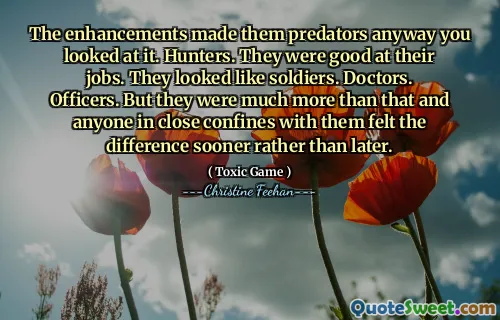
The enhancements made them predators anyway you looked at it. Hunters. They were good at their jobs. They looked like soldiers. Doctors. Officers. But they were much more than that and anyone in close confines with them felt the difference sooner rather than later.
This quote vividly portrays individuals who, on the surface, appear to embody professionalism and authority—soldiers, doctors, officers—roles traditionally associated with protection, service, and disciplined duty. However, the narrative reveals a stark contrast between their outward appearances and their true nature, emphasizing that they are, at their core, predators. This dichotomy invites a reflection on the nature of facades and the masks people wear, especially in environments where power, deception, or hidden agendas are at play. The phrase 'enhancements made them predators' suggests deliberate modifications or evolutions that transformed these individuals into more efficient or dangerous entities, arguably stripping them of their humanity or ethical boundaries. The sense of forewarning that 'anyone in close confines with them felt the difference sooner rather than later' heightens the tension, implying that proximity to such individuals is inherently dangerous, potentially exposing the dark undercurrents behind their polished exteriors. It prompts the reader to consider themes of trust, deception, and the latent threats hidden within those who might seem on the surface to be protectors or authority figures. In complex narratives, such characters challenge our assumptions about morality and identity, highlighting how appearances can be deceiving and how the true nature of a person can be revealed through subtle cues or direct experience. Ultimately, this quote encapsulates the unsettling truth that predators can wear many masks, often masquerading as protectors, making it crucial to remain vigilant and discerning in understanding people's genuine nature.



